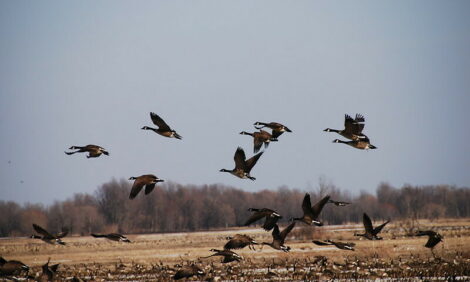



Sustainability Key to Food Production Challenge
UK - The message from the NFU came loud and clear at the Inside Government Food Security Forum; farmers can and will grow more food to feed a growing population – while impacting less.However NFU Vice President Gwyn Jones was quick to point out that environmental sustainability needed to be delivered hand in glove with economic sustainability if farmers are to make the necessary investments in their farm business.
Speaking after addressing the Forum on Tuesday Mr Jones said: “I am pleased to say the title for my part of the debate was Farming Matters – and it certainly does. But now it’s not only us farmers who think this; government and consumers are showing us they do too.
“With recent IGD figures showing that the number of people buying local food has doubled over the past five years, and coupled with Caroline Spelman’s recent commitment to increasing our country’s food production, I would say it is a good time to be a farmer.
“But let’s be clear; we do have massive challenges ahead. We are on the brink of a second green revolution, with food production at its centre, but we can’t just farm and be damned. On one hand we have population growth but on the other global warming; we have a rising demand for energy but depletion in fossil fuels. We see an increasing demand for food across the globe but a scarcity of water and other natural resources with which to produce it. And let’s not forget the constraints of the current economic situation.
“So why is this a good time to be a farmer? Many members I meet are seeing new opportunities and grabbing them with both hands. Agriculture is investing around 35 per cent of its GVA and this investment is helping us prepare for the type of food production that does produce more but impacts less.
“From state-of-the-art environmentally savvy poultry sheds to GPS kits for arable farmers, and soft fruit growers using remote control led trickle irrigation to save water while increasing yields, innovation is everywhere – and it needs to be. British farmers and growers may be rising to the challenges of food production in the 21st century but there are urgent gaps that need filling.
“Our belief that government should protect its spend on agriculture R&D to ensure we close the gap from lab bench to field has been well documented. Technologies like GM also need, I believe, to be part of the mix. And with the industry developing at such a pace, skills have never been more important. While the skills gap figures from Lantra show that 40 per cent of vacancies are hard to fill there is good news there too. The Royal Agricultural College is reporting a 24 per cent increase in new students and the NFU is also a key supporter of the industry-led AgriSkills forum, helping to counter the perception that farming is an unskilled sector.
“Joining such an experienced line up of speakers I am pleased to be able to highlight that impacting less is becoming our ‘business as usual’. Farmers and growers want and need to derive their income from a productive, environmentally-sound farm business; this is a must. For that we need to ensure our supply chain functions properly and that the direction of travel, whenever we look to reform the CAP, keeps productive farming at its heart.
“Food production is now a national and international top priority; British farmers can and will play their part.”









